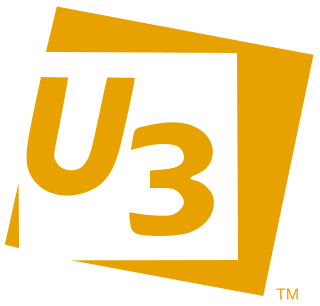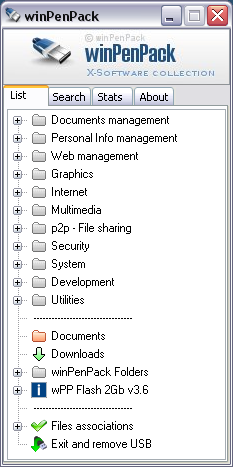A computing platform, digital platform, or software platform is an environment in which software is executed. It may be the hardware or the operating system (OS), a web browser and associated application programming interfaces, or other underlying software, as long as the program code is executed using the services provided by the platform. Computing platforms have different abstraction levels, including a computer architecture, an OS, or runtime libraries. A computing platform is the stage on which computer programs can run.

Damn Small Linux (DSL) is a computer operating system for the x86 family of personal computers. It is free and open-source software under the terms of the GNU GPL and other free and open-source licenses. It was designed to run graphical user interface applications on older PC hardware, for example, machines with 486 and early Pentium microprocessors and very little random-access memory (RAM). DSL is a live CD with a size of 50 megabytes (MB). What originally began as an experiment to see how much software could fit in 50 MB eventually became a full Linux distribution. It can be installed on storage media with small capacities, like bootable business cards, USB flash drives, various memory cards, and Zip drives.
This is a comparison of both historical and current web browsers based on developer, engine, platform(s), releases, license, and cost.
Mozilla Firefox has features which distinguish it from other web browsers, such as Google Chrome, Safari, and Microsoft Edge.
Netscape Plugin Application Programming Interface (NPAPI) is a deprecated application programming interface (API) for web browser plugins, initially developed for Netscape Navigator 2.0 in 1995 and subsequently adopted by other browsers.
Safe mode is a diagnostic mode of a computer operating system (OS). It can also refer to a mode of operation by application software. Safe mode is intended to help fix most, if not all, problems within an operating system. It is also widely used for removing rogue security software.

U3 was a joint venture between SanDisk and M-Systems, producing a proprietary method of launching Windows software from special USB flash drives. Flash drives adhering to the U3 specification are termed "U3 smart drives". U3 smart drives come preinstalled with the U3 Launchpad. Applications that comply with U3 specifications are allowed to write files or registry information to the host computer, but they must remove this information when the flash drive is ejected. Customizations and settings are instead stored with the application on the flash drive.
As the next version of Windows NT after Windows 2000, as well as the successor to Windows Me, Windows XP introduced many new features but it also removed some others.

A portable application, sometimes also called standalone, is a program designed to operate without changing other files or requiring other software to be installed. In this way, it can be easily added to, run, and removed from any compatible computer without setup or side-effects.

A live USB is a portable USB-attached external data storage device containing a full operating system that can be booted from. The term is reminiscent of USB flash drives but may encompass an external hard disk drive or solid-state drive, though they may be referred to as "live HDD" and "live SSD" respectively. They are the evolutionary next step after live CDs, but with the added benefit of writable storage, allowing customizations to the booted operating system. Live USBs can be used in embedded systems for system administration, data recovery, or test driving, and can persistently save settings and install software packages on the USB device.
MojoPac was an application virtualization product from RingCube Technologies. MojoPac turns any USB 2.0 storage device into a portable computing environment. The term "MojoPac" is used by the company to refer to the software application, the virtualized environment running inside this software, and the USB storage device that contains the software and relevant applications. MojoPac supports popular applications such as Firefox and Microsoft Office, and it is also high performance enough to run popular PC Games such as World of Warcraft, Minecraft and Half-Life 2.
Swiftweasel was a fork of Mozilla Firefox available for the Linux platform only.

PortableApps.com is a website that distributes free applications for Windows that have been packaged for portability. These portable applications are intended to be used from removable storage devices such as USB flash drives.

Google Chrome is a web browser developed by Google. It was first released in 2008 for Microsoft Windows, built with free software components from Apple WebKit and Mozilla Firefox. Versions were later released for Linux, macOS, iOS, and also for Android, where it is the default browser. The browser is also the main component of ChromeOS, where it serves as the platform for web applications.

winPenPack is an open-source software application suite for Windows. It is a collection of open source applications that have been modified to be executed directly from a USB flash drive without prior installation. WinPenPack programs are distributed as free software, and can be downloaded individually or grouped into suites.
Firefox was created by Dave Hyatt and Blake Ross as an experimental branch of the Mozilla browser, first released as Firefox 1.0 on November 9, 2004. Starting with version 5.0, a rapid release cycle was put into effect, resulting in a new major version release every six weeks. This was gradually accelerated further in late 2019, so that new major releases occur on four-week cycles starting in 2020.
Windows 8, a major release of the Microsoft Windows operating system, was available in four different editions: Windows 8 (Core), Pro, Enterprise, and RT. Only Windows 8 (Core) and Pro were widely available at retailers. The other editions focus on other markets, such as embedded systems or enterprise. All editions support 32-bit IA-32 CPUs and x64 CPUs.
Browser security is the application of Internet security to web browsers in order to protect networked data and computer systems from breaches of privacy or malware. Security exploits of browsers often use JavaScript, sometimes with cross-site scripting (XSS) with a secondary payload using Adobe Flash. Security exploits can also take advantage of vulnerabilities that are commonly exploited in all browsers.






